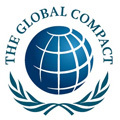The UN Global Compact has released its 2014-2016 strategy, which describes how to make corporate sustainability a transformative force in achieving a shared, secure and sustainable future, so as to align with and contribute to the UN process for setting the post-2015 development agenda.
 10 February 2014: The UN Global Compact has released its 2014-2016 strategy, which describes how to make corporate sustainability a transformative force in achieving a shared, secure and sustainable future, so as to align with and contribute to the UN process for setting the post-2015 development agenda.
10 February 2014: The UN Global Compact has released its 2014-2016 strategy, which describes how to make corporate sustainability a transformative force in achieving a shared, secure and sustainable future, so as to align with and contribute to the UN process for setting the post-2015 development agenda.
As detailed in the strategy, over the next three years, the Global Compact will accelerate its transition from incremental progress implementing corporate sustainability to transformational action, with impacts on the financial, environmental, social and ethical spheres. It hopes to achieve this through focusing on: effective participant engagement; Local Networks (clusters of participants working together to advance the Compact and its principles within a particular geographic context); its global portfolio of issues; and responsible business in support of UN goals and issues.
More specifically, the Global Compact aims to: reach 13,000 business participants by 2016, while focusing on enhanced levels of reporting and transparency; empower Local Networks by setting standards and enabling them to facilitate actions and solutions that will affect the post-2015 development agenda; ensure coherence of its global portfolio of issues, including human rights, labor standards, environment and anti-corruption, as opportunities for business to advance corporate sustainability; develop a sustainable funding model; strengthen the governance framework and accountability; and improve partnerships to advance UN goals, enhance the UN system’s capacity to more effectively partner with the private sector, and illustrate the ways in which the ‘Post-2015 Business Engagement Architecture’ can contribute to the post-2015 development agenda.
The Global Compact’s management and staff developed the strategy with support from Deloitte, following 18 months of consultation with a range of stakeholders, including the Global Compact Board, governments and Local Networks. Since 2004, the Global Compact has conducted periodic reviews and developed three-year plans. [Publication: Strategy 2014-2016] [Global Compact Press Release] [Global Compact Strategy Website]